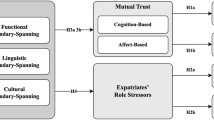Abstract
This paper uses data from the World Banks Enterprise Surveys to assess the impact of family ties on managerial compensations in selected African SMEs. The results suggest that while managers who are related to the owners of an enterprise receive higher performance-based compensations than professional managers, their compensations are less sensitive to firm performance than that of professional managers. These findings parallel those of Chinese enterprise managers identified by Cai et al. (Rev Econ Stat 95(3), 850–867, 2013). This suggests that family relations play a significant role in compensation schemes for enterprises in developing and emerging markets and that differential treatment exists between family and non-family managers.

Similar content being viewed by others
Notes
Of course the manager can turn the contract down in which case the two go their separate ways and nothing happens.
Notice that when \(\delta = 0\) (trust is zero), the payoffs revert to the standard principal-agent model that corresponds to a professional manager.
Differentiation yields \(\frac{\partial \beta ^{*}}{\partial b} = \frac{8(1-\delta )^{2}\lambda \gamma \sigma ^{2}}{((1-\delta )^{2}b^{2} + 4\lambda \gamma \sigma ^{2})^{2}}> 0\).
The list of countries with firms included is as follows. Numbers in parentheses indicate number of firms from the country in the sample: Namibia (8), Burundi (6), Tanzania (10), Uganda (22), Guinea (10), Botswana (4), Angola (21), Swaziland (4), Mauritania (10) and Rwanda (10)
For robustness, managers are later defined to include the second-layer chain of command that includes supervisors.
While it would be useful to know the extent of family relations (nuclear or not), the survey data do not provide further details. However, it is sufficient to know whether owners and managers are related since extended families still feature prominently in many African societies, and kinship sometimes goes beyond the nuclear family setting.
Due to the small sample size, the model does not control for firm-specific effects. However, the use of firm size as a control variable is likely to account for any firm-idiosyncratic effects.
Further estimation using fixed salary as a dependent variable was performed (as a form of falsification test), and interestingly, performance did not have a significant effect on fixed salary (these results are not reported, but can be provided upon request.
References
Atkin, D., Khandelwal, A.M., & Vogel, J. (2011). Institutions, family firms and the lack of manufacturing employment: Evidence from Ethiopia.
Ayyagari, M., Demirgüç-Kunt, A., & Maksimovic, V. (2011). Small vs. young firms across the world: Contribution to employment, job creation, and growth. World bank policy research working paper (5631).
Beck, T., & Demirguc-Kunt, A. (2006). Small and medium-size enterprises: Access to finance as a growth constraint. Journal of Banking and Finance, 30(11), 2931–2943.
Bertrand, M., & Schoar, A. (2006). The role of family in family firms. The Journal of Economic Perspectives, 20, 73–96.
Bigsten, A., & Söderbom, M. (2006). What have we learned from a decade of manufacturing enterprise surveys in Africa? The World Bank Research Observer, 21(2), 241–265.
Cai, H., Li, H., Park, A., & Zhou, L.-A. (2013). Family ties and organizational design: Evidence from Chinese private firms. Review of Economics and Statistics, 95(3), 850–867.
Eifert, B., Gelb, A., & Ramachandran, V. (2008). The cost of doing business in Africa: Evidence from enterprise survey data. World Development, 36(9), 1531–1546.
Haddad, L., & Maluccio, J. A. (2003). Trust, membership in groups, and household welfare: Evidence from Kwazulu-Natal, South Africa. Economic Development and Cultural Change, 51(3), 573–601.
Kauffmann, C. (2005). Financing SMEs in Africa. Technical report. OECD Publishing.
Lacovone, L., Ramachandran, V., & Schmidt, M. (2014). Stunted growth: Why don’t African firms create more jobs? Center for global development Working paper (353).
Söderbom, M., & Teal, F. (2004). Size and efficiency in African manufacturing firms: Evidence from firm-level panel data. Journal of Development Economics, 73(1), 369–394.
Te Velde, D. W., & Morrissey, O. (2003). Do workers in Africa get a wage premium if employed in firms owned by foreigners? Journal of African Economies, 12(1), 41–73.
Van Biesebroeck, J. (2005). Firm size matters: Growth and productivity growth in African manufacturing. Economic Development and Cultural Change, 53(3), 545–583.
Acknowledgments
I thank the associate editor Erik E. Lehmann, an anonymous referee, Ousman Gajigo, Christa Jensen and Adam Pellillo for helpful comments.
Author information
Authors and Affiliations
Corresponding author
Additional information
The views expressed here are the opinions of the author only and do not necessarily represent those of the African Development Bank.
Rights and permissions
About this article
Cite this article
Bempong Nyantakyi, E. Family ties, firm performance and managerial compensations in African SMEs. Small Bus Econ 46, 493–501 (2016). https://doi.org/10.1007/s11187-015-9692-7
Accepted:
Published:
Issue Date:
DOI: https://doi.org/10.1007/s11187-015-9692-7




